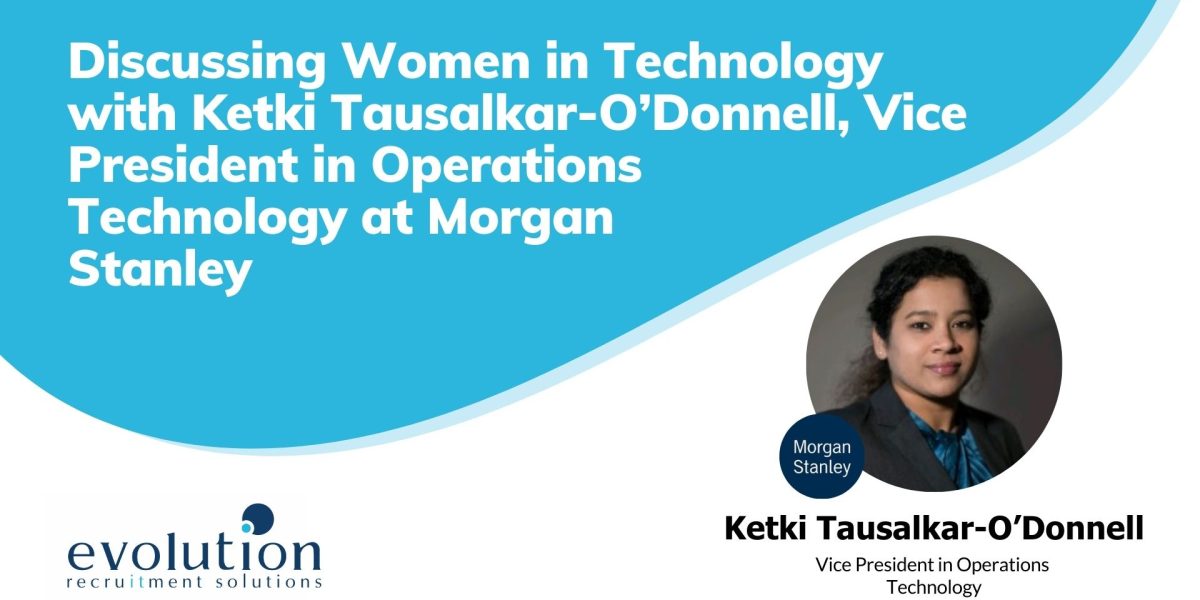
Ketki Tausalkar-O’Donnell, a Vice President within Operations Technology at Morgan Stanley, is originally from Mumbai, India. She completed her Bachelor’s degree there, then began the graduate programme in the Operations Division at J P Morgan Chase. After spending several years there, she moved to Deutsche Bank, working in reporting and analysis, whilst also completing her Master’s and Post Graduate degrees. In 2011, she was headhunted by Morgan Stanley and joined a new team within their global operations division.
At Morgan Stanley, Ketki moved through several roles and found her love for project management and data analysis. Through managing various projects, the opportunity arose for a move to Glasgow, then to London. In her current role, she runs a project as part of the operations technology division.
“I found the drive to get out of the comfort zone, see what’s out there. Experiencing different cultures and different workplaces is definitely an add on bonus.”
Ketki is an inspiration for those who want to work in the tech field but don’t necessarily have a technical background. The key is recognising both what you can offer to a tech role and what benefits it could bring to you.
“If you’re constantly thinking ‘what if I don’t have the answers to everything?’, recognise that you don’t need to have the answers to everything, you can take an angle of coming into technology to enhance your skills that you already have. You will also be able to apply what you’ve learned through all the years of whatever experience it is that you have too. You get the right support if you speak to the right people.”
It is important in a technical role – if you don’t come from a technical background – to realise that you won’t know everything and to ask as many questions as you can. This could be to your manager, your team or anyone else who is in a position to answer. Through these questions, you will learn and develop into your role.
“If you’re experienced, you worry that you’re supposed to know it all. No, you’re not, you can still ask the question. You’ll still get the support that you need to be able to be successful. So especially when you start off, don’t hesitate to ask for help.”
Women in the technology industry often come up against blockers that a man in the same situation would not. For example, a lack of mentors or role models higher up, or having to face societal pressures when pursuing a career which is traditionally viewed as masculine. Ketki is grateful for the support she has received throughout her career.
“I think as a woman, I felt more aligned to not pushing myself in my career, but my parents have always been my biggest cheerleaders, mentors and supporters. My Dad said, if not today, when? How many opportunities do you let go? You don’t want to live in regret.”
In her leadership role, Ketki is always aware that she is shaping people at the beginning of their journey and that she is a person that her team members will look up to. Because of this, she sees calling out biases as her responsibility. She does this privately with team members, ensuring that they receive feedback and are given insights to consider about their behaviour.
“It’s not easy to have those conversations. It’s never easy to have the first one. Keeping it simple can make it casual enough to go through with it. Just go with the simple mindset of, I want to just have a chat. They may not realise it’s their blind spot, and unless someone calls it out, they’re going to continue doing it.”
For women hoping to join the technology industry, Ketki’s advice is to leave your understanding of what the industry is about at the door, and ask questions with an open mind. Through conversations with women already in the industry, you will be able to determine whether it is for you and shut out the negativity from those who might doubt you.
“Definitely shut out the negativity. If someone’s giving you constructive inputs, that’s great. That’s knowledge for you to keep in mind. But if someone says don’t do it, consider why they are saying that.”
Alongside this, Ketki’s principle throughout her career is to always learn and grow, and she extends this advice to others. By viewing each challenge as a learning opportunity, failures no longer matter because they themselves are simply a lesson.
“Start from a place of what’s the worst that can happen? You’re making the right decisions, because it’s still teaching you a lot more, you’re learning through the process, you’re meeting new people. Tell yourself that you’re doing a good job, give yourself a pat on the back to say, I’m still here, and still doing what I love doing. Where possible, become a mentor too, because that teaches you immensely.”
Ketki’s final advice is to consider that not everything will come easily and you have to go into these challenges with an open mind.
“Constantly challenge yourself and push yourself to do things outwith your comfort zone, because that’s where the real opportunities lie. When I have done this, I’ve discovered new things about myself that have built my confidence and created even more opportunities for me. This shows that you can handle any challenge and people will be drawn to you. You never know where the next opportunity will come from, so be ready to leap at it with your full, authentic self.”